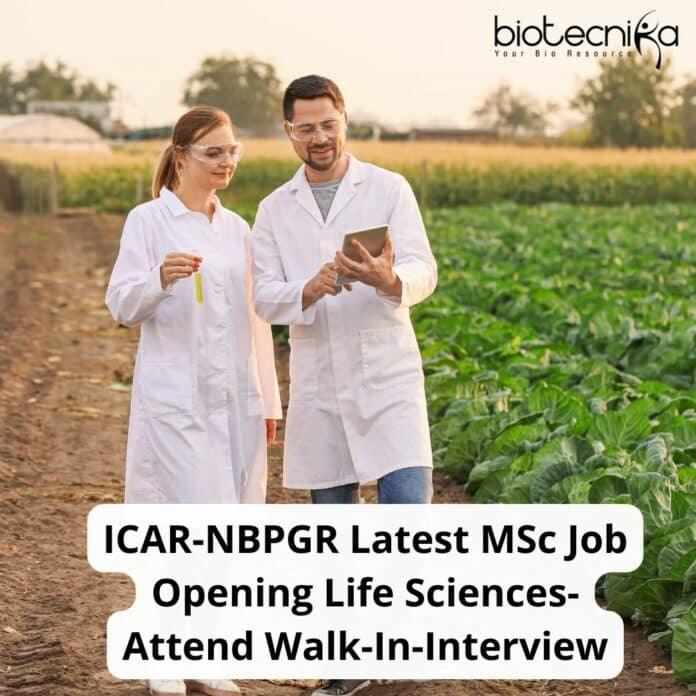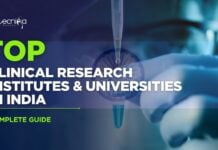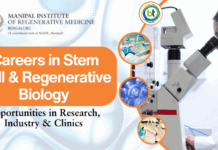NBPGR Bioinformatics Job – MSc Agricultural Sciences YP Vacancy
NBPGR Bioinformatics Job – MSc Agricultural Sciences YP Vacancy. Young professional-II Job. ICAR-NBPGR-MSc Jobs Young professional-II Job Opening at ICAR-NBPGR. Interested and eligible candidates can check the details below.
This job expires in
ICAR-National Bureau of Plant Genetic Resources
Pusa Campus, New Delhi – 110012, India
Applications are invited to attend a Walk in Interview for the posts of two Young Professional-II on 3 October 2023 at the National Bureau of Plant Genetic Resources, New Delhi, as detailed below:
Name of the Post: Young professional-II
No. of Posts: 02
Name of Project: Genomics of black pepper, green cardamom and fenugreek for relating genes to traits of economic importance (funded by ICAR-CRP on Genomics)
Name of PI: Dr. Ambika B Gaikwad (Email ID: [email protected])
Date of Interview: 3rd October, 2023 (reporting time 9:00AM to 10:00AM)
Duration: One year, extendable for additional two years/ Co-terminus with the project
Age Limit: Minimum age 21 and maximum age 45 years with relaxation as per rules (as on date of advertisement).
Terms and Conditions:
- Candidates are requested to ensure their eligibility like age, qualification etc. before appearing for the interview. Each degree and diploma should be from a UGC recognized university
- Candidates having essential qualification will only be considered for interview.
- No TA/DA and official accommodation will be provided for appearing in the interview.
- The post is purely temporary and co-terminus with the project, selected candidate have no right to claim for regularization or absorption whatsoever in ICAR/NBPGR
- The decision of Director of the institute will be final and binding in all aspects.
- Retention of the candidate(s) on the post is subject to their satisfactory performance, availability of funds.
- The Director shall reserve the right to terminate the contract of job as mentioned above, even before the completion of the project for which no appeal thereof shall be made
- Candidates are required to bring the relevant certificates/ mark sheets etc. in original along with an application with full bio-data enclosing photocopies of certificates and mark sheets from matriculation onwards duly attested affixing a passport size photograph on the top. The selected candidate will be required to produce medical certificate at the time of joining.
- In case of any disputes, it will be resolved in the jurisdiction of New Delhi court only.
Job Description: Generation and analyses of whole genome sequencing data, transcriptome data, molecular marker and genotyping data and related downstream wet lab experimentation and analyses.
Essential Qualifications: Post-Graduation in Agricultural Sciences/Life Sciences/ Bioinformatics/ Molecular Biology/ Biotechnology/Botany/Genetics
Desirable Qualifications:
- Experience in using Next generation sequencing techniques, molecular markers, routine molecular biology techniques, licensed and open source software for NGS data analyses, practical knowledge of Linux, R programming.
- Minimum two years’ experience in the relevant area of research.
Emoluments: Rs 35,000 consolidated per month
Check the notification and application format here
Here are interview questions with answers for the Young Professional-II position at ICAR-National Bureau of Plant Genetic Resources:
1:Can you explain your experience with Next Generation Sequencing (NGS) techniques and how you have used them in your previous research projects?
Answer: In my previous research experience, I have actively utilized Next Generation Sequencing (NGS) techniques to generate large-scale genomic data. Specifically, I have worked on projects involving whole genome sequencing, transcriptome analysis, and genotyping using NGS platforms. For instance, in my last project, we conducted whole genome sequencing of a crop species to identify genetic variations associated with important traits. I also performed transcriptome analysis to understand gene expression patterns under different conditions. These experiences have equipped me with a solid understanding of NGS methodologies, data handling, and downstream analyses, making me well-prepared for the tasks outlined in this role.
2:How comfortable are you with Linux and R programming? Can you provide examples of how you have applied these skills in your previous work?
Answer: I am proficient in both Linux and R programming, which are essential tools in bioinformatics and genomics research. In my previous role, I regularly used Linux for tasks such as data preprocessing, running bioinformatics pipelines, and managing high-throughput sequencing data. Additionally, I utilized R programming for statistical analysis, data visualization, and scripting custom data analysis workflows. These skills allowed me to streamline data analysis processes, extract meaningful insights, and contribute effectively to research outcomes.
3:Describe your experience with molecular marker analysis and routine molecular biology techniques. Can you provide an example of how you applied these techniques to solve a research problem?
Answer: I have hands-on experience in molecular marker analysis and routine molecular biology techniques. In a previous research project focused on crop improvement, I employed molecular markers to identify specific genetic traits associated with disease resistance. I conducted PCR-based marker assays and gel electrophoresis to validate the presence of target genes. Additionally, I performed DNA extraction, PCR amplification, and genotyping to characterize genetic diversity in plant populations. These techniques were instrumental in developing marker-assisted breeding strategies, ultimately leading to the development of disease-resistant crop varieties.
4:Can you share an example of a challenging situation you encountered during your previous research work and how you resolved it?
Answer: In one of my previous research projects, we faced a significant challenge when analyzing a vast amount of sequencing data generated from a diverse plant population. The challenge was to efficiently manage and process this data within tight timelines. To address this, I implemented a data management strategy that involved optimizing computational workflows, parallelizing data analysis tasks, and utilizing cloud computing resources. This approach significantly reduced the data processing time and allowed us to meet project deadlines successfully. This experience taught me the importance of adaptability and innovative problem-solving in research settings, especially when dealing with large-scale genomic data.
Editor’s Note: NBPGR Bioinformatics Job – MSc Agricultural Sciences YP Vacancy. Please ensure you are subscribed to the Biotecnika Times Newsletter and our YouTube channel to be notified of the latest industry news. Follow us on social media like Twitter, Telegram, Facebook and Instagram.









































